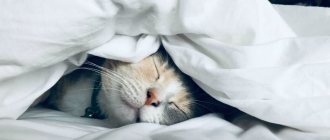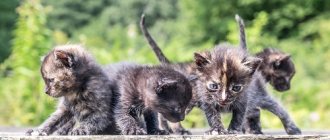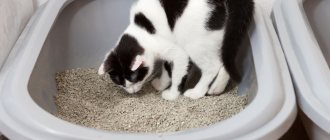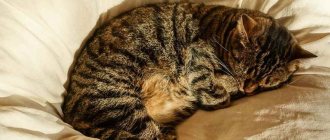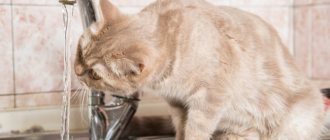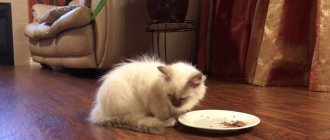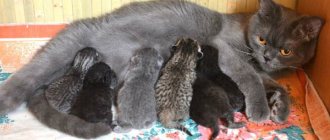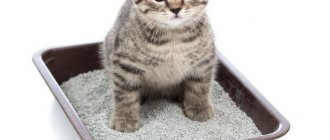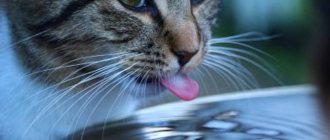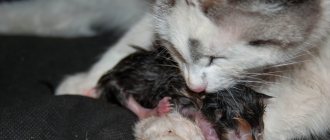Signs of lethargy and weakness
Cats spend a lot of time sleeping, but not all of them, and it won’t be difficult for an attentive owner to notice changes in the pet’s behavior. If the animal had the habit of frolicking from time to time, running from room to room, actively pouncing on treats and coming to the owner’s lap to be petted, then diametrically opposite behavior should alert the owner.
- chooses tasty pieces, leaves the rest on the plate or has completely lost interest in food; any toys are forgotten, the animal hides and prefers to lie down; when trying to pet the animal, it leaves, shows signs of irritation, the skin of its back twitches nervously; does not respond to his name.
This behavior, if it lasts more than a day, requires special attention from the owner and a visit to the veterinary clinic.
Why does my cat eat poorly and sleep a lot?
Such changes in a pet's behavior can be signs of a variety of ailments. Note that fasting cats for 1-2 days, according to experts, may be a variant of the norm. After all, in this way they cleanse their stomach. And, of course, in order not to waste energy, pets will sleep longer. Then, upon completion of this self-cleaning, the animals eat well again and become more playful and active.
When appetite does not return for more than 2-3 days, signs of illness can be suspected. Especially if, in addition to loss of interest in food, the cat also experiences increased thirst, a hot nose, rapid pulse, difficulty breathing, pale gums, a coating on the tongue, and enlarged lymph nodes under the jaw. The presence of at least one of the above signs may indicate the following pathologies:
- Worms. The most common reason. Practice shows that drowsiness and lack of appetite in felines in most cases are caused by roundworms. At the same time, the cat begins to lose weight quickly. The animal sleeps for a long time because all its strength is taken away by parasites. The solution to the problem is the use of anthelmintic drugs.
- Ticks. They appear in the spring, when it gets warmer, and literally immediately look for a host from whom they drink blood, injecting their waste products into it. This causes intoxication. It manifests itself in cats as drowsiness and loss of interest in food. You can avoid the problem by using a special collar or insecticidal drops.
- Poisoning. It is rarely the cause of a deterioration in appetite, because a well-developed sense of smell helps cats sense stale food and avoid it. But kittens can suffer from their own curiosity, swallowing completely inedible things. In this case, young pets are saved by Smecta.
- Digestive problems. In long-haired animals, the stomach is often clogged with hairs, which can be cleared with special foods. Problems with the liver and pancreas also lead to a significant decrease in appetite.
Causes of lethargy
Almost any somatic disease (pathology of internal organs caused by external or internal factors not related to the animal’s psyche) can be accompanied by lethargy and weakness. In this case, the animal stops eating, meows pitifully, vomits, or develops diarrhea, it swells, gets fat or loses weight. In short, there are other symptoms that look more alarming than refusal to play or lack of desire to sit on the owner’s lap. But there are situations when, apart from the animal’s apathy and its reluctance to move and respond to its name, there are no symptoms, should the owner worry in this case?
If such a condition in an animal lasts no more than a day and passes without consequences, then it is not dangerous. Everyone has a bad mood, including cats. An animal may be offended by one of the family members if they did not play with it, change its bedding, or remove its favorite post for scratching its claws. But this condition does not last long and does not need correction.
Some cats can react to the weather. In this case, their depression is temporary, does not last more than 12-24 hours, and goes away on its own when the weather improves. But these conditions are repeated, and the owner may notice the periodicity and connection with natural phenomena.
Unneutered cats taking the pills may become depressed. At the same time, a loving owner can see how spoiled their mood is: they are gloomy, lethargic, eat less and react irritably to attempts to pet them, and do not want to play.
Cats may not cope well with a change of home or the departure of their owner. In this case, the animal may develop deep depression. As a result, the cat will hide under the sofa or closet, refuse food and even growl if you try to give it something to drink or eat. This condition can last for several days.
If the owner has not noticed any pattern, lethargy haunts the animal for more than a day, it is worth taking the animal to the veterinarian. If this cannot be done right away, you can try to examine the pet yourself. Measure his body temperature. A high temperature may be a sign of an incipient infectious disease or hormonal disorder.
You can feel the cat’s stomach; perhaps the animal has swallowed an object, is constipated, or has parasites actively multiplying. These conditions are not always accompanied by vomiting or acute constipation (diarrhea), but the stomach will be tight, the abdominal wall will be tense and painful.
It is necessary to carefully examine the animal's skin for ticks, bites, abrasions, wounds, swelling, tumors, and any anomalies that may tell the owner that something bad is happening to the animal.
If the owner knows the weight of his animal, the cat can be weighed. Excessive weight gain or loss may be evidence of endocrine disorders (diabetes mellitus, thyroid dysfunction) or the growth of a malignant neoplasm. You need to pay attention to the quality of the wool, whether it is too much, whether it has become thin, or whether it is losing its shine. Are there any crusts or scratches in the croup area?
General swelling is sometimes difficult to detect.
Bad symptoms in kittens
If isolated edema (especially if one limb is swollen) is easy to notice by comparing its size with the other limb of the animal, then general edema can be missed. With swelling, the elasticity of the skin and subcutaneous layer decreases. An owner who has frequently petted an animal may notice tension in the tissue. Swelling is a sign of a serious illness; the animal must be shown to a specialist.
If a cat hides under the bed or tries to climb into another hard-to-reach place, refuses water or food, this means the animal is very ill and must be taken to the hospital without delay. In addition to examining the animal itself, you need to pay attention to the cat’s stool (quality, presence of foreign inclusions or undigested lumps of food, smell and color), urine (frequency of urination, painlessness, clarity of urine, absence of impurities, color, smell). Any changes may indicate serious problems with the animal’s health (gastritis, ulcers, colitis, pancreatitis, hepatitis, glomerulonephritis, poisoning, allergies, etc.).
Dangerous symptoms
A kitten that sleeps a lot, does not like to play active games, eats poorly and eats little, may be seriously ill. Pay attention to your pet and the presence of other pathological symptoms. Signs of the disease :
- dry and hot nose;
- refuses to drink;
- temperature, body tremors;
- loose stools;
- vomit;
- pallor of mucous membranes;
- dull coat;
- impaired coordination;
- giving up your favorite treats;
- lack of reaction to people, loud sounds, lights;
- dilated pupils;
- rapid breathing.
Any of the listed symptoms is considered a deviation from the norm. To understand why your pet has stopped playing, eating and drinking, you need to consult a veterinarian.
If you know that the cause of poor health is poisoning, rinse the kitten’s stomach and give activated charcoal. After these steps, go to the veterinary clinic.
Treatment
If the animal behaves apathetically for a short time, treatment is most often not required. But if the owner is worried, you can take the animal to the clinic. If the animal is apathetic for more than a day, there are no apparent reasons for this, you need to consult a doctor.
If, against the background of apathy, the animal has no appetite and does not drink, at the diagnostic stage it needs maintenance therapy. Typically these are glucose injections or infusions with solutions that replenish fluid loss and maintain electrolyte balance in the animal’s body. Treatment will depend on the diagnostic results.
leave a comment
Comments (3)
Add a comment
A long-awaited pet has appeared in your home - a little kitten. Of course, it requires care and attention. You need to carefully monitor the kitten's condition, especially in the first days and weeks.
Sometimes kitten owners are faced with the problem of their pet's reluctance to eat. There may be several reasons for this.
It happens that a kitten does not eat or drink during the first 2-3 days in a new home. He is lethargic, doesn't want to play and sleeps almost all the time. This may occur due to the stress that the baby feels in a new environment. Try sometimes smearing his mouth with milk, this will help him start lapping from the saucer. Of course, this does not apply to very tiny kittens who do not yet know how to lap. These need to be fed from a pipette. Usually the adjustment period lasts 2-3 days.
So try not to worry if your pet refuses to eat at first.
An overview of the causes of lethargy, drowsiness and poor appetite in cats
Try to treat him with something tasty, but don’t put a bunch of stuff on his plate and wait for it to go bad. If the kitten does not eat within a short time, remove it. It is better to give warm, heated food (but not hot) or food at room temperature. Food straight from the refrigerator will not be good for your kitten. If your kitten is under 4 months old, it is better to feed him 4-5 times a day, and from 4 to 8 months - 3 times a day. It is recommended to feed adult cats (after 8 months) 2 times a day, but it can be done more often (this is individual, it depends on your pet). It happens that a kitten does not eat simply because he does not like the food. This is especially true for special food for kittens. It often happens that a kitten begins to eat when they buy another type of food or treat him to regular food (meat; dairy products; boiled sea fish without bones no more than 2-3 times a month; porridge - semolina, rice, oatmeal; grated vegetables - carrots , cabbage, zucchini, pumpkin with a small amount of unrefined vegetable oil).
As for cat food, it is best not to give it to a small kitten. Dry food is strictly contraindicated! Only canned food produced specifically for small kittens is allowed.
Your pet may refuse to eat for several reasons. If the kitten is healthy and cheerful, he may not respond to the bowl simply because he is not up to it. He is busy with his own affairs, his games and pampering. During such exciting activities as chasing a sunbeam, your little pet may simply forget about food! Perhaps he was not yet hungry. If the kitten is cheerful, active, plays and drinks water, there is no reason to worry. And if he comes up to the plate, pokes at it, wants to eat, but leaves crying, you need to check his mouth. There could be some foreign object stuck there (for example, a bone). It is necessary to examine the gums and throat. If, in addition to refusing to eat, the kitten is lethargic, inactive, lies down all the time, if its fur is unkempt, you need to be wary and consult a doctor. You should immediately go to the doctor if there are additional symptoms: vomiting, diarrhea, mucus coming out of the eyes or nose, the baby has difficulty breathing, or he is sneezing and coughing.
In any case, at the first alarming symptoms you should be wary.
Watch the kitten carefully. If he simply refuses to eat, but still drinks water and plays, everything is fine. If there are other symptoms, contact your veterinarian immediately and help the animal recover.
Reasons when a cat eats little and is sleepy
Let's look at the main reasons.
Worms
This is what roundworms look like - the most common type of worms in cats.
The people are simply worms. The onset of the disease is difficult to notice. The animal usually eats normally, but loses weight quickly.
If the disease is advanced, the appetite disappears, problems with feces are observed, and the pet feels unwell.
Helminths are treated only with appropriate medications and prevention.
Ticks
Cat flare close-up.
In the warm season, ticks, lice eaters, fleas and other parasites are a common cause of a pet’s poor health and mood. Ticks are especially dangerous, so your cat needs to be checked carefully after going outside.
If your animal is walking, then put a special collar on it or treat it with special means.
Poisoning
A cat can become poisoned if it eats a mouse that has previously been poisoned with rat poison.
It can be easy and pose no threat, or complex. If an animal could eat something that is expired, then poisoning is quite possible. As a rule, it is not strong, lasts up to two days and goes away on its own.
If symptoms such as rapid heartbeat and breathing, hot ears and dry nose, dull fur, or fever are observed, you should contact your veterinarian.
Complex poisoning can be caused by:
- foreign bodies that have entered the animal’s gastrointestinal tract, components;
- components that are dangerous to the health of cats that are part of detergents and household chemicals;
- dangerous plants;
- raw meat, fish, poultry, if they have been contaminated;
- poisoned rodents.
Self-medication in this case is useless and dangerous. You should immediately go to a veterinarian who will provide professional care. Only in this case can the animal be saved and cured.
Intestinal obstruction
Difficulty on ultrasound.
This problem affects long-haired individuals, animals over 10 years old and cats that shed frequently.
Hairballs, hair, and foreign bodies may enter the intestines.
If the animal cannot go to the toilet for more than 3-4 days, and its abdomen has noticeably enlarged, and the abdomen is tight on palpation, then immediately consult a veterinarian.
In most cases, special medications are prescribed and IVs are installed. In some cases, surgery is performed to remove the foreign body, and the animal recovers.
Asthma
Asthmatic cat.
Inflammation or emphysema of the lungs, asthma. The disease is accompanied by cough, hoarseness, and heavy breathing. A visit to the veterinarian followed by antibiotic treatment will help.
Urolithiasis
This ultrasound shows urolithiasis in a cat. Although cats are much less likely to suffer from this disease than cats.
In this case, the cat does not pee or does it rarely and in small portions. Your pet may make sounds to indicate that it is in pain. Problems with the kidneys and bladder occur in cats and female cats, both regular and sterilized.
Causes: infection, hypothermia, stone formation. The veterinarian prescribes appropriate medications, and in case of stone-forming diseases, puts in IVs to quickly clean the urinary tract.
Bruises
If the cat is lethargic and moves little, then examine its limbs for injuries and bruises.
Bruises, dislocations, fractures. An animal can simply damage its paw, rib, or neck. To rule out a fracture, it is necessary to take an x-ray if the cat is limping.
The combination of symptoms may indicate the development of neoplasms and chronic diseases. Of course, these cases are rare, but it’s still better not to ignore them and get them diagnosed so that if anything happens, you can help your pet in time.
Why does a kitten not eat anything and how to deal with it - Proper nutrition for your cat and cat
Appetite disturbances in kittens can be quite common. If a kitten does not eat anything for a long time, this can significantly deteriorate its health. To treat the disease, it is necessary to accurately determine the cause of loss of appetite and promptly take action to eliminate it. A kitten’s refusal to eat can lead to its death; you shouldn’t let it slide and put it off until “later.”
What are the consequences for a kitten if it refuses to eat?
If a kitten does not eat for a long time, this can lead to the development of serious diseases. These are disorders of the gastrointestinal tract, liver and kidneys. Poor nutrition in a kitten leads to the development of anemia. This condition is dangerous because blood depleted of red blood cells does not deliver enough oxygen to the organs. Therefore, the kitten’s breathing and heart rate become more difficult and faster if the kitten does not eat anything.
Prolonged fasting, as well as insufficient nutrition, contributes to the fact that the kitten does not receive enough nutrients and is stunted in growth.
Why does the kitten eat poorly?
A kitten's refusal to eat is a sign of many cat diseases:
- The presence of a source of infection in the body; Food poisoning; Too intense feeding. In this case, the small animal simply decided to take a fasting day and rest; Incorrectly selected food; Disease of the gastrointestinal tract. In this case, the kitten must be shown to a veterinarian; The kitten may not eat because it does not have the opportunity to play enough. To do this, it is necessary to organize his leisure time; Loss of appetite can also be a result of weather changes.
What to do if the kitten does not eat
If you notice that your kitten is refusing food or not eating well, you need to do the following:
- Take the cat's temperature. An increase in temperature indicates the presence of infection, a decrease in temperature indicates a loss of vitality. Remember that the temperature of a healthy cat is 38 degrees. You need to feel your stomach. If the kitten starts screaming, it means you have hit a sore spot. If the animal constantly screams, this may be a sign of volvulus. You should not give your cat a laxative without finding out the reason for the lack of appetite. This can lead to intestinal rupture or internal bleeding. You should not massage your kitten if it shows signs of dissatisfaction. You need to take the kitten to a veterinary clinic. You cannot refuse tests and x-ray examinations. Remember that surgery is a last resort: about half of the kittens survive after it. To prevent this from happening, you need to support the kitten’s body with IVs and injections. Artificial maintenance of the body should be carried out until digestion is normalized, or until surgery becomes the only, albeit small, chance.
Possible pathological conditions
If the cat has been lethargic for several days, sleeps a lot, drinks and eats poorly, and can barely walk, the owner should under no circumstances let the situation take its course. Such a condition in the pet’s body most likely signals the development of a serious disease. The cat must be shown to a doctor in the next few hours.
Anemia
Anemia occurs when a cat's body produces less red blood cells and hemoglobin.
In addition to the fact that with anemia, a cat is lethargic and sad, it also exhibits other signs of this unpleasant disease:
- the nose becomes lighter;
- mucous membranes acquire a bluish tint;
- blood pressure decreases;
- the pulse is sometimes rapid, sometimes rare;
- breathing accelerates, shortness of breath appears;
- the fur becomes dull and may fall out;
- clear discharge appears from the nose.
Diseases of the cardiovascular system
If the cat eats poorly and constantly sleeps, is lethargic, tries to walk less - these may be signs of the development of a disease of the cardiovascular system.
Your pet may be bothered by fluctuations in blood pressure.
It is important! Normally, blood pressure in cats can “jump” from 105/65 to 135/95 mmHg.
With high blood pressure, furry couch potatoes experience:
- lethargy;
- decreased vision (while moving, the cat may bump into furniture and other objects);
- rapid pulse;
- dilated pupils;
- redness of the eyes;
- sometimes vomiting;
- in some cases - nosebleeds.
With low blood pressure, the pet refuses to eat due to nausea, sleeps a lot, its pulse slows down, and the cat may even lose consciousness.
In acute heart failure, the animal is also lethargic, its breathing becomes difficult, shortness of breath and bluish discharge from the nose appear.
An important symptom of the development of heart disease in a cat is its characteristic posture in a relaxed state. She usually stands with her front legs spread wide. This makes it easier for her to breathe.
Gastrointestinal diseases
Often the cause of a pet's lethargic and sleepy state and his refusal to eat are diseases of the gastrointestinal tract.
With gastrointestinal pathologies, a cat may exhibit symptoms:
- bloating;
- stools that are very dark, almost black, or mixed with blood and mucus;
- belching;
- constipation;
- flatulence.
Diseases of the urinary system
The development of urinary system diseases in cats, in addition to a lethargic state and lack of appetite, is accompanied by symptoms:
- too frequent or infrequent urination, or its complete absence;
- constant pain when urinating;
- the appearance of blood or pus in the urine;
- sweetish smell from the mouth;
- lower back pain;
- extremely unpleasant odor of urine.
To reduce pain at least a little, the animal lies down almost all the time, does not drink or eat.
It is important! If your pet has a blockage in the urethra, without medical attention he may die within 3 days.
Infectious diseases
In many cases, a cat’s lethargic behavior, refusal to feed and staying in almost constant sleep indicate an infectious disease.
Such diseases are extremely dangerous for cats and require immediate medical attention. The owner must remember that the life of his pet is literally counted in minutes.
The most dangerous infectious diseases that cause cats to become very lethargic are:
- Leptospirosis: Caused by the bacterium Leptospira. The disease affects almost all cat organs and is very dangerous for humans;
- Calcivirosis is a viral disease that affects the respiratory tract. It occurs mainly in cats under 2 years of age, but sometimes in older individuals;
- FIV is feline viral immunodeficiency: an extremely dangerous disease that affects the immune and nervous systems. Only representatives of the cat family, including wild representatives, can become infected with it;
- Panleukopenia (popularly called feline distemper) is a deadly disease that develops very quickly. It affects the cardiovascular, digestive and respiratory systems of the cat and is accompanied by intoxication of the entire body;
- herpes virus infection (another name is rhinotracheitis): caused by the feline herpes virus. Affects the respiratory and visual organs. If the animal is weakened by other diseases and does not receive proper treatment, the infection can lead to death.
What to do if the kitten doesn't eat anything?
Sometimes a small kitten does not eat anything, what should the owner do in this case? In some cases, the reason lies in a stressful situation. For example, a baby has just been taken away from its mother. Or he moved to a new house. For many animals, this is a huge shock when the usual atmosphere changes. But sometimes it’s all about the presence of helminths, inflammation or infection.
Reasons why a kitten does not eat food
Let's figure out why the kitten doesn't eat anything? What made the baby starve?
Stress
No matter how proud cats are, they are very sensitive. It would seem, what’s wrong with moving or a change of scenery? But such little things can affect the psychological state of the animal. The animal needs a couple of days to adapt to the changed conditions. If possible, eliminate all possible sources of stress and provide your baby with peace. Let fresh water and some food be within his sight, but away from people. Perhaps the kitten needs a calm environment and privacy.
Too young
Some people buy kittens that are too small. Unscrupulous breeders are trying to “fuse” kittens as quickly as possible so that the cat goes into heat faster and gets offspring from her again. As a result, kittens do not yet know how to eat on their own. Hence the hunger strike.
The baby would be happy to eat a hearty meal, but he can’t, he doesn’t know how. To prevent the baby from starving to death, you will have to purchase a special cat's milk substitute (it costs a lot, but is ideal for kittens) and a bottle. Cow's or goat's milk are not suitable because the kitten's intestines cannot digest such fatty milk.
Environment
Cats are very clean (with rare exceptions), so they are uncomfortable with the fact that their feeding area looks untidy or dirty. The animal will endure to the last, but will not touch even its favorite food if the bowl is poorly washed or there is a lot of garbage around the feeding area.
Strong odor from food or bowl
Some bowls made of polymers, especially in the first days of their use, have a strong, unpleasant odor. Cats have a keen sense of smell. And such a “bright” chemical smell will repel the pet from food. In addition, food can smell like plastic and have an unpleasant aftertaste. But even if the bowl (in your opinion) no longer smells, the detergents you use to clean your cat's bowl may have a strong odor. do not forget that they also have a fairly diverse chemical composition. Still, it is better not to use chemicals when washing dishes for feeding an animal. If you want to kill the infection, then simply pour boiling water over the bowl (if the manufacturer and material of the dishes allow this).
Helminths
Some types of parasites, on the contrary, awaken a brutal appetite in the baby. But still, in most cases, the tiny organism is not able to fight helminths. All the forces of the immune system are spent exclusively on the fight. Therefore, there is absolutely no money left for food consumption. Modern veterinary drugs can be given to tiny kittens. Some anthelmintics can be given just once, but it is usually recommended to repeat the procedure after 10-14 days.
This is due to the fact that during this time those parasites that were not affected by the first dose reach a different stage of development. And now on it they become sensitive to the active ingredient of the anthelmintic. Be sure to carry out 2 procedures for expelling parasites, even if you do not find any worms in the kitten’s feces or vomit. Perhaps his body contains just the larval stage, which is covered with a dense shell that does not allow the drug to kill the helminth.
Infectious diseases
The little kitten does not eat because an infection has raged in its body. At least remember yourself during the flu. Do you eat a lot? And a baby, especially if he is too early or has just been torn away from his mother, can have a huge number of life-threatening diseases. Any infection clings to his fragile body. The immune system is not yet very developed. That is why it is so important to carry out preventive vaccinations according to age on time. This can save the purr from a lot of problems.
What to do?
If you have taken into account all the rules for feeding kittens and knowing the reasons why the kitten does not eat, first of all you need to get rid of it. No reason - no problem. If you have ruled out the effects of stress, and the bowl and feeding area are perfectly clean and without any odor, then run to the veterinarian. It's better to be safe than sorry. Have your doctor examine a kitten that doesn't want to eat. If the examination reveals a disease, the veterinarian will prescribe the necessary treatment. Next, we have prepared some tips on what to do if the kitten does not eat anything, which may be useful to you.
Self-medication will not give results; it will only worsen the pet’s condition. Making diagnoses on the Internet is not the best way to solve the problem of kitten starvation. But even during treatment, appetite may not be fully restored.
Bottle with nipple, pipette or nurse cat
A bottle with a nipple, a pipette or a nurse cat is the solution for very tiny kittens. If the kitten is very small, then buy a bottle with a small diameter nipple so that it fits in the kitten's mouth, and a cat milk replacer. Or find a nurse cat. Perhaps one of your friends has recently given birth to a pet, so you can try to attach your starving baby to her. Just let them smell each other first. Some adult animals defend themselves from other people's children.
Don't try to force feed! This can frighten a kitten who won't eat anything. Yes, sometimes the only way to prevent a small pet from dying of hunger. But this should be a last resort.
Place soft, wet food in a bowl
Only a little. Otherwise if it goes bad. After all, food must be fresh. If you want to offer natural food, you can try adding some boiled fish or lean meat.
When a kitten doesn't eat, he should at least drink
Therefore, put a plate with clean (filtered or boiled) water. If the baby does not know how to lap on his own, then he will have to drink water either through a pipette or through a pacifier, at least in small portions.
No fatty foods
Many people drink the broth. However, this is not the best option, since the body of a meowing fluffy is not yet ready to digest fatty foods. Especially when the hunger strike lasted for several days. A weakened body needs very light food. Yes, when the kitten does not eat food for only one day, and the animal’s age exceeds 2-3 months, then you can try giving it broth through a bottle. Just don’t add salt or add any seasonings. For meat, do not take pork or lamb, this is too fatty meat.
Try finger feeding
Alternatively, try giving from your finger. Drop a little on your finger (water, milk, low-fat sour cream, broth) and bring it to the baby’s nose. If he stubbornly turns away, do not “rape” him. Try a little later (in half an hour or an hour). If a kitten who does not eat from the bowl suddenly licks food from his finger, then drip more. Gradually move your finger closer to the bowl; perhaps the kitten will taste the food from your hands and try to eat from the bowl on its own. It is preferable to use soft food so that you do not need to chew for a long time, just licking it off the bowl would be enough. A good option is canned meat for children. They are without salt, the meat is perfectly chopped, and often they also contain cereals.
Contact the breeder
If you took it from a breeder, then ask him what to do if the kitten does not eat, whether the baby was vaccinated, what the baby was fed before the sale. Perhaps you are offering food that is unusual for him. Some purebred kittens are very fussy about food. Wrong manufacturer, wrong taste, wrong form. Therefore, contact the breeder and find out the details of feeding the baby of the breed you purchased from him.
Do not delay visiting the veterinarian, even if the kitten has started to eat. Let him rule out serious illnesses.
Ways to deal with the problem
Confused furry owners who find themselves in such a situation ask what to do if the kitten does not eat anything. First of all, you need to make sure that he is not sick and that the kitten does not have worms. Poor condition may be indicated by the absence of stool or liquid excrement, blood in the stool or traces of worms, mucus, as well as severe vomiting, cloudy “sour” eyes, nasal discharge, unpleasant odor from the mouth, complete refusal of food and water.
Such an animal feels very weak, its stomach hurts, and sleep is disturbed. You should immediately contact a veterinarian, and if the baby is very weak, you should call a doctor at home.
If the kitten is not in danger, he feels quite normal, sleeps and drinks water, you need to find out why he so persistently ignores what is offered to him:
- If the baby is too small to feed on his own, owners will have to work hard. You need to purchase a special cat milk substitute, drink it from the nipple, and give it drops from your finger or from a cotton swab to very tiny babies. You should not give cow's milk - it is too fatty. You can try diluting it half and half with water and watch how your baby digests it. Ideally, you need to find a nursing cat that can become a wet nurse or milk donor.
- A good way to get a kitten to eat is to hand-feed food. It should be fresh, tasty and soft food, soft enough for a small creature. Gradually, the habit of eating it from a flat saucer will form. In the same way, a cat is taught to drink water.
- If the kitten protests against new food, you need to call the breeder or previous owners. Having seen the usual food, the baby will begin to eat, then it will be possible to gradually change his diet.
- To find out why your kitten won't eat anything and how to get him to stop his hunger strike, you should check the dishes. If it is dirty or has an unpleasant odor, you need to replace it with a new one or thoroughly wash and disinfect it.
- The feeding area must be clean.
- Food should be laid out in small portions and removed immediately as soon as the cat is full.
- Meals should be adjusted according to time. Kittens quickly get used to the regime.
- Provide the new pet with peace and privacy during the first days of its stay in the new home, and prohibit children from squeezing it or making too much noise.
- If your kitten eats but refuses water, he may not be able to lap or is not familiar with the bowl. He needs to be given water from a pacifier and gradually accustomed to a saucer.
- Babies learn to eat and drink on their own faster if a pet older than them lives in the house. He will serve as a role model.
If you don't miss a serious illness, you can deal with any feeding problems on your own. When the owner does not understand what is happening to the pet, it is best to simply take him to the veterinary clinic. There they will examine him, check his health and explain in detail what needs to be done.
What to do if the kitten does not eat anything
The growing body of a young animal, like a human, has a good appetite. But sometimes owners notice that their kitten is not eating well. What are the consequences of this situation, what are its reasons and what to do if the pet has practically lost interest in food and eats very little and poorly? All answers to such questions can be found in this article.
The dangers of not enough food for a kitten
An adult cat is able to survive for a long time without food or get by with a minimum of it. But for a small animal, nutritional deficiency can lead to serious problems. If a kitten does not eat anything or eats very little and poorly, this is fraught with:
- gastrointestinal diseases; anemia; pathologies of the liver and kidneys; breathing disorders; heart rhythm disturbances; developmental and growth retardation.
Of course, these complications occur when the animal eats poorly and eats little for quite a long time.
It happens that appetite disappears for just a few days, and then returns to normal. But if the kitten is thin and has not been eating well for a week or more, it’s time to sound the alarm.
Causes of decreased appetite
There are quite a few factors that provoke a decrease in appetite in kittens. Some can be easily eliminated, while others are difficult to treat even in a clinical setting. Here are the main reasons:
- the animal eats poorly because the food does not suit it; decreased appetite is caused by changes in weather or living conditions (a kitten may not eat due to stress, just like a person); the owners overfeed the pet, and it protests, showing poor appetite; the baby doesn’t get enough attention or play and is sad, feeling bad “morally”; an infection has entered the body; there is any disease of the gastrointestinal tract, so the kitten refuses to eat; the animal eats little due to food poisoning.
If the kitten begins to eat poorly, you definitely need to figure out why. Often you cannot do this on your own. In this case, a veterinarian will help.
What should the owner do?
Having noticed that the animal is eating little and poorly, the first thing you need to do is measure its temperature. If it is elevated, there may be an infection in the cat’s body. If it is low, the pet has little vitality. The normal temperature of a healthy cat is 38 degrees. Everything else is bad.
Next you should feel your stomach. If the baby becomes restless and cries, it means he is in pain, and you need to look for the cause in the pathology of the gastrointestinal tract.
It happens that the animal constantly screams, does not eat and refuses to drink water. This is very bad because it may indicate a volvulus.
If the kitten approaches the bowl and tries to eat, but immediately jumps away, it probably has problems with its teeth or gums. And it happens that he does not like the smell of food or feeding utensils and therefore treats it poorly. The owner should change the diet and detergent.
Many owners complain that the kitten does not eat dry food well. This means that the baby’s body does not accept such food. Veterinarians, by the way, consider it not the best option for tiny cats. It is better to replace food with healthier products (liver, milk, cottage cheese, meat, etc.). At the same time, you should not give large pieces - food for tiny pets needs to be ground or at least kneaded with a fork to make it convenient to eat.
If the kitten eats very little immediately after weaning from the mother’s breast, this is a variant of the norm. You can help him by giving him milk from a pipette. The situation should stabilize after a few days, when the baby gets used to the new conditions of his life.
Under no circumstances should situations be allowed where a kitten does not eat anything for a long time. This is deadly for him.
Babies who are several months old grow quickly, and if there is little food, the body immediately becomes exhausted.
Of course, it’s not always the case that when your tailed pet doesn’t eat much, you need to immediately run to the doctor. The kitten may simply not want to eat at the moment, as it was already full. But if a day or more has passed, and the kitten is not eating much, and is not behaving as usual: it worries, screams, constantly sleeps, examination and help from a veterinarian will definitely be required!
Possible reasons
The reasons why a kitten does not want to eat may not be related to disease:
- Stressful state. When a baby is suddenly taken away from its mother, it is not surprising that the kitten does not eat well - it is experiencing the first separation in its life.
- A kitten eats little if the food is unusual for it. Some breeds of cats are famous for their capricious disposition in relation to food - they will literally die of hunger, but will not touch food that they do not like or that turns out to be unusual.
- Weaning too early is one of the common reasons why a kitten has no appetite. This is usually what unscrupulous breeders do, trying with all their might to increase the number of matings and offspring to make a profit. When a kitten is tiny, it is accustomed to cat milk with a special composition. If he has not yet been accustomed to complementary feeding, then it is not at all surprising that the kitten does not eat or drink - he simply does not know how yet. Coping with such a situation is difficult, but possible. It is much easier to make sure in advance that the animal is already taking complementary foods and will not cause additional trouble.
- Sometimes the reason that a kitten has stopped eating can be completely banal - a new bowl for food or drink. Sometimes plastic products have a very pungent and unpleasant odor in the first days of use, which is why cats with a keen sense of smell simply do not smell the food - it is “clogged” by the unpleasant “aroma” emanating from the plastic. Children should be given food not in plastic, but in glass or ceramic containers; they do not contain volatile flavors and are highly hygienic. Before using such dishes, it is good to pour boiling water over them - this will both disinfect it and “kill” extraneous odors.
- Just like a foul-smelling bowl, dirt and debris around the area where cats are usually fed can deter animals from eating.
- The presence of helminths is a common reason for kittens taken from the street or accidentally refusing to eat. Worms cause severe intoxication of the entire body, so the baby begins to have digestive problems. He vomits and feels sick, he breathes heavily, does not eat or eats very little, but drinks a lot. The kitten is lethargic and thin, sometimes refusal to eat can alternate with unexpected bouts of gluttony. Helminth infections are dangerous, especially if it is a small kitten, so such symptoms should alarm the owners.
- Infections or diseases of internal organs. A kitten under 6 months of age does not have a strong immune system and can easily get sick. With infectious diseases, he sleeps all the time and lies all day, does not touch food, only drinks water, breathes heavily, and often feels sick even from drinking water. These signs indicate that the baby is sick and needs urgent help.
The most dangerous symptom is the animal's reluctance to drink. This can have various reasons: from a cold to a dangerous infection and even rabies. If this condition lasts longer than 2 days, the kitten constantly lies down, sleeps a lot, breathes heavily, does not eat or drink, you should immediately go to the veterinary clinic with it.
Why does the kitten eat very little, or not eat at all?
In the first weeks of a kitten's life, its main food is cat's milk. With it, the kitten receives a complex of substances necessary for normal growth and development. In addition, cat milk contains antibodies that promote healthy immunity.
The diet of an older kitten that has stopped feeding on milk should be designed so that its fragile body continues to receive all the necessary substances. Without food, a kitten cannot live long. But sometimes it happens that the baby himself refuses to eat; you should under no circumstances ignore this and wait until he starts eating.
The most harmless of all possible reasons for refusing to eat may be the kitten’s absolute satiety. Sometimes owners overfeed kittens, which is undoubtedly a mistake. A small, overfed kitten may feel full for a long time and go to the bowl only to drink.
Another, more serious reason why a kitten eats very little may be poor nutrition. A kitten's diet should be appropriate for its age and contain everything it needs. It is not recommended to feed your baby large pieces of meat that he is not able to eat, or dry food. The kitten's food should be mushy and the portions should be small. From improper nutrition, he may experience discomfort, pain and, in the end, completely refuse food.
But not only overeating and poor nutrition can be the cause of food refusal. This may be a symptom of a developing disease. Kittens are often attacked by viral infections. A sick kitten sleeps a lot, eats little and looks lethargic and confused.
If you are not sure why the kitten is not eating, you should not waste time and wait for the problem to solve itself. As a rule, viral diseases develop quickly, and inaction can lead to serious consequences. Only timely contact with a specialist can correct such a situation.
It’s a completely different matter if the kitten comes to the bowl but doesn’t eat. The baby may have problems with the oral cavity. He wants to eat, and can even meow pitifully while sitting at the bowl, but he cannot eat. You should examine the kitten's mouth, or better yet, contact a veterinarian.
Natural reasons for refusing to eat
Cats are very sensitive animals, often reacting with a lack of appetite to factors that are not significant in the opinion of their owners:
- dirty dishes. Cats are extremely clean, so unwashed bowls with leftover food and the smell of sour food can cause reluctance to eat. Poorly washed plates pose a potential threat for the development of various intestinal diseases. Dishes washed with a product with a strong, persistent odor can ruin the appetite of any animal;
- high air temperature.
When hot weather sets in, all animals experience a decrease in appetite. A cat can lie on the floor all day without showing interest in food. In such a situation, there is no need to try to feed your pet. During hot weather, cats should always have access to fresh water. Dehydration of more than 15% can cause irreversible changes in the functioning of the animal's body; Heat can cause your cat to lose appetite - change of diet. Often, when suddenly switching from natural food to dry food (and vice versa), cats refuse to eat. The same situation occurs when changing the brand of food. Before introducing new foods, the owner should study the composition and recommendations of the manufacturer. A change in the animal’s diet should be carried out by first adding and then gradually replacing the usual food with a new one, monitoring the pet’s appetite;
Domestic cats are very finicky creatures, but the creators of dry food managed to please them. Most purrs, having tried dry granules, refuse to return to natural food. This is very convenient for owners. Find out how to properly feed your cat dry food in our separate article.
- change of feeding place. When moving a bowl of food to the wrong place, the cat may completely or partially refuse food. In this case, it would be better to return the plate to its original place or find another animal that suits it;
- stressful situations. Undeserved punishment, a change in the situation in the house, moving, or the appearance of a new pet can cause stress in a cat. The consequence may be complete refusal of food. In such a situation, the animal needs to be petted more often and treated with treats. If the animal does not calm down for more than 2 days, you should contact a veterinarian and resort to treatment with sedatives;
- aging.
As a cat ages, it becomes less active and less likely to show interest in food. In this case, it is recommended to give your pet more treats, change the diet, monitoring appetite and the amount of food eaten; old cat - accumulation of fur. When actively licking, hairballs accumulate in the cat's stomach. Loss of appetite in such a situation may be accompanied by vomiting and bowel dysfunction. Taking special hair removal products purchased from a veterinary pharmacy quickly eliminates the problem. Timely combing of the animal's hair prevents its accumulation in the cat's stomach;
- hormonal surge.
During puberty, during the period of estrus (cats) and “binges” (males), the pet may not eat for 5-7 days without significant harm to the body. Appetite returns as soon as the animal calms down; How to calm a March cat - pregnancy. 1-2 weeks before giving birth, sometimes the cat’s appetite decreases. This is due to the increase in the size of the kittens in the tummy. It is necessary to switch to higher quality food, rich in minerals and vitamins, increase the number of feedings, reducing the dosage. You can find out how to tell if your cat is pregnant in our separate article.
Why does your pet try to eat litter?
If there is a lack of calcium and minerals in the body, cats may begin to eat granules that are poured into the tray. This can cause intestinal problems. The silica gel composition is especially dangerous, as it sticks to the pet’s internal organs and in some cases leads to the pet’s death.
Eating filler
The best way out of the situation is to purchase calcium-containing vitamins, add bone meal and nutritional supplements rich in minerals to food. If the problem does not go away, you urgently need to change the brand of filler and monitor the result.
Reference! Sometimes cats scratch their teeth with litter granules, swallowing the splattered pieces. The problem is solved by including pork and beef bones in the pet’s diet.
